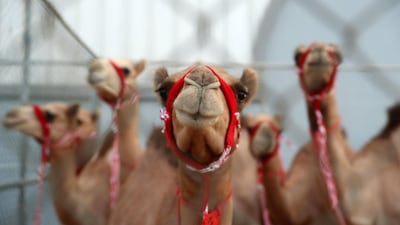The discomfort of road travel in the region is eased by soundproofing to deaden the engine noise, comfortable seats to cushion the bumps and powerful air-conditioning.
But camels have none of these luxuries when being driven by road, making journeys unappealing for them.
“It is well known that transporting animals is often stressful,” said Prof Andrew Knight, an Australian veterinary surgeon and professor of animal welfare and ethics at the University of Winchester in the UK. “The whole transport process involves a number of stresses.”
They may include rough handling, sharing the ride with unfamiliar animals, which can be disturbing for creatures with established social hierarchies, unfamiliar sights and sounds, and being deprived of food and water for the journey. Animals may also be bruised from knocks.
Camels sometimes react aggressively when being moved on to a vehicle and, like other farm animals, they may be handled roughly.
Science can find out much about how the animal is feeling with a vast range of parameters.
Studies have shown that loading and transporting causes stress in pigs, sheep and cattle, with heart rates increasing and the hormone cortisol, which is linked to stress in people and other mammals, at higher levels in the blood.
Until a few years ago, much less was understood about the effect of transport on camels but the gaps in knowledge are gradually being filled in by scientists.
Among them is Prof Mohammed El Khasmi, director of the laboratory of physiopathology and molecular genetics at the University of Hassan II in Casablanca, Morocco.
In 2015, Prof El Khasmi and a team of co-researchers published what is thought to be the first study demonstrating increased stress levels in camels from road travel.
The research found that cortisol levels were higher in camels that had been taken to Casablanca than in those taken a shorter distance.

Now, in the Emirates Journal of Food and Agriculture, a new study by Prof El Khasmi and other scientists has investigated further into the issue, looking specifically at the effect of how crowded the vehicle is.
Sixteen male camels, aged between four and seven years, were put into two groups of eight. Each group was subjected to a different loading density.
In one group, the animals had 2 to 3.6 square metres each. The animals in the other group were driven in much more cramped conditions, with just 1.4 to 1.8 square metres for each camel.
Both groups were carried by lorry for between 72 and 80 kilometres on tarred roads at speeds of between 60 and 65kph.
The animals were kept in a squatting position facing sideways with their forelegs tied by a rope at the knees. They were not given food or water during the journey.
Their temperature, and heart and breathing rates were tested before the journey and when it ended. A host of biochemical variables were looked at, including the level of cortisol and other substances in the blood.
Many substances were present at higher levels at the end of the journey than at the beginning, indicating that the journey had stressed the animals out.
What was most notable was that the animals that had been packed in more tightly in the lorry were more stressed than those that had been given more room.
“I was not surprised to find that a high loading density in road transport trucks would be much more stressful in the dromedary,” Prof El Khasmi said.
______________
Read more:
Study reveals 'aggressive and deceitful' behaviour among camels during mating season
Special report: On Oman's great camel khateel, where the land is struggling to support the ship of the desert
______________
He said that in all of the work carried out by his group and other researchers, the camel has been shown to be very sensitive to physiological factors such as deprivation of water and food, environmental variables, physical treatment and pathological stress.
If the animals are crowded in too tightly, they might be trampled because they are at risk of being unable to get up again if they fall down. In crowded conditions overheating is also a bigger problem, as a high density of animals can increase the temperature by 3°C.
But if the density is too low, the animals may not support each other as the vehicle goes around corners, so the density should probably not fall below a certain level.
Prof El Khasmi’s study gives scientific evidence as to what density of animals would be best for their welfare.
Many measures can be considered to make transport less stressful, Prof Knight said.
Using vehicles with temperature controls, non-slip surfaces and ramps for entry and exit are all likely to be of benefit to the animals.
“It’s common in some countries for there not to be unloading and loading ramps, which results in the animals being forced to jump off the back or being thrown off, resulting in injury,” Prof Knight said.
The effects of poor transport conditions goes beyond animal welfare. Changes in the blood involving chemically reactive forms of oxygen can have a harmful effect on meat quality.
In some animals, such as cattle, more stress can affect the acidity of the meat and cause it to be darker, leading to the name “dark-cutters” for the animals affected.
The beef may not be suitable for sale directly to consumers, so profits can be affected. It is often used in the food service industry instead.
The potential effects of stress on camel meat is among the next things that Prof El Khasmi and his co-researchers are looking at.
Their results could be of great interest to the camel meat industry.


